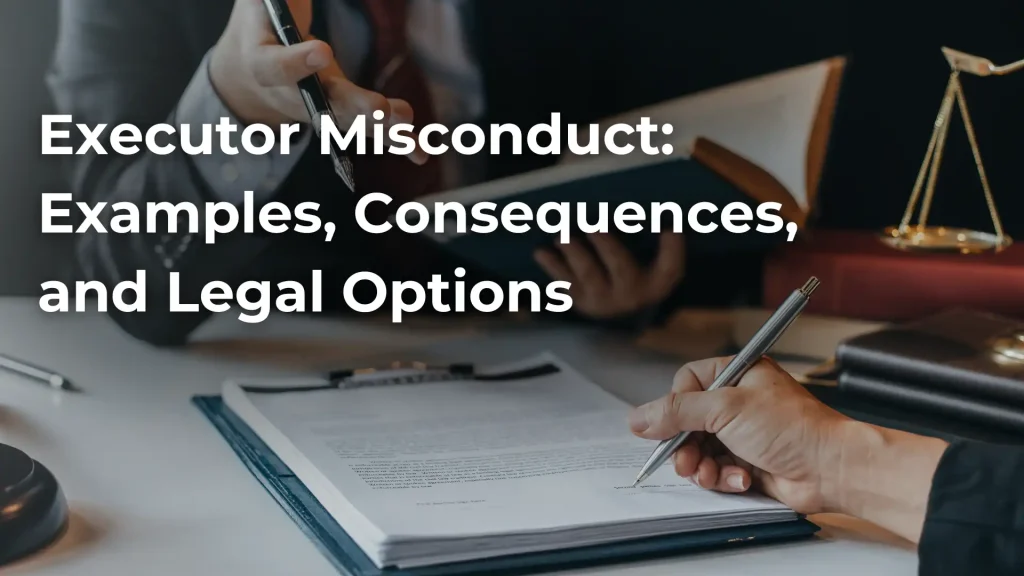
Trusts are powerful tools for preserving family wealth, but they can also lead to heated disputes. Questions about a trust’s terms or the creator’s mental state frequently cause conflicts. In many cases, trust dispute resolution methods—such as mediation or arbitration—can produce better results than going to trial.
At Staubus, Blankenship, Legere and Walker PLLC, we want what’s best for your family and to protect your rights if there’s a trust dispute. Our Dallas trust litigation lawyers have decades of combined experience that we can use to resolve your disagreement, whether through litigation or other methods. If you’re interested in trust dispute resolution options that avoid court hearings, we’re ready to help you find the best path forward.
What Is a Trust Dispute?
Trust disputes involve someone challenging some aspect of the document or its oversight. These disputes often involve claims of fraud, undue influence over the trust’s creator, or unclear language in the trust document. For example, a beneficiary might feel mistreated or accuse a trustee of wrongdoing—situations where trust dispute resolution can help address concerns without the stress of litigation.
Common Causes of Trust Disputes
Some common reasons behind trust disputes in Dallas include:
- Undue Influence – A beneficiary might challenge a trust if they believe someone pressured or manipulated the person creating it into writing the trust a certain way. For example, someone might argue that a family member coerced the trust’s creator during an illness or after an injury.
- Lack of Capacity – Disputes can arise when it’s unclear whether the grantor was mentally competent when they made or altered the trust. (The grantor is the person who created the trust.)
- Breach of Fiduciary Duty – The law requires trustees to act in the best interests of the beneficiaries. Disputes can occur due to accusations of a trustee mismanaging funds, favoring particular beneficiaries, or failing to follow the trust’s terms.
- Ambiguous Language in the Trust – Vague or confusing language in the trust document can lead to disagreements over the grantor’s intentions and how to distribute the trust’s assets.
- Exclusion of Expected Beneficiaries – When family members are left out of a trust unexpectedly, they may challenge the document’s validity.
- Improper Execution—A trust might be subject to legal challenges if the creator didn’t sign documents properly or have them witnessed properly.
- Fraud or Forgery – Allegations of altered documents or forged signatures often lead to lengthy legal battles over trusts.
- Unaccounted or Missing Assets – Beneficiaries may question the trustee’s estate handling when assets listed in the trust are missing or not properly transferred.
Legal Options for Resolving Trust Disputes

People often want to jump straight to a trial when trust disputes occur. However, alternative methods can help preserve family relationships and save money for all involved. Some ways to resolve trust disputes include:
- Informal Negotiation – You may be able to resolve a trust dispute through open discussions with an angry family member or other beneficiary. Clear communication between trustees and beneficiaries can avoid court battles entirely.
- Mediation – In many cases, a neutral third party can help resolve a trust dispute without involving the courts. Mediation is confidential, less expensive, and often faster than a courtroom battle.
- Settlement Agreements – If everyone agrees, you can resolve the dispute by signing a formal agreement. This document can change how the trustee will handle the trust’s assets or clarify unclear terms.
- Trust Modification or Reformation – If the trust’s language is vague or outdated, you can ask a court to modify or clarify it without a full trial.
- Accounting Requests – As a beneficiary, you can request a formal accounting of the trust’s assets from the trustee. This procedure can resolve confusion about asset distributions and other familiar sources of trust disputes.
- Trustee Removal – If you believe a trustee has misbehaved, you can petition the court to have them removed and replaced.
- Probate Court Petition – In some cases, filing a simple petition with the court for instructions or clarification can resolve a dispute without a full trial.
- Filing a Lawsuit – Litigation (a trial) may be necessary when other options fail. In these circumstances, you can take the dispute to the probate court and ask a judge to decide.
Contact Our Dallas Estate Litigation Attorneys
The Dallas trust litigation lawyers of Staubus, Blankenship, Legere and Walker PLLC can protect your rights and help you resolve your trust dispute, no matter your side. Our team has over 100 years of combined experience and in-depth knowledge of these issues, and we can use those tools to achieve your goals. Call (214) 833-0100 now or complete our contact form for a consultation.
Related Post
How a Trust Could Help You Avoid Paying Inheritance Taxes
Is It Better to Have a Revocable or Irrevocable Trust?

When an executor breaches their legal obligations, can you sue the executor for breach of their fiduciary duty in Texas as an estate beneficiary? What does the process of suing an executor look like? And what relief can you obtain for a breach of fiduciary duty—especially if you’re considering whether you can sue an executor for breach of fiduciary duty?
What Is the Executor’s Fiduciary Duty?
The executor of an estate has a fiduciary duty to act in the estate’s best interests and those of its beneficiaries. Key fiduciary duties that executors must fulfill include:
- Duty of Loyalty – Loyalty requires an executor to act in the estate’s and its beneficiaries’ best interests and prioritize their needs over the executor’s needs or wishes. This duty requires an executor to avoid conflicts of interest where the executor’s interests or needs may conflict with those of the estate and its beneficiaries. When an executor identifies a potential or apparent conflict of interest, they should disclose it to the beneficiaries and the court and either withdraw from the decision or obtain an informed waiver.
- Duty of Good Faith – The duty of good faith requires executors to act honestly, diligently, and lawfully. An executor must administer an estate to the best of their ability, making reasonable decisions or taking reasonable actions based on professional advice and the executor’s best judgment.
- Duty of Impartiality – An executor must not show favoritism to one beneficiary over another. The executor’s decisions should not favor one beneficiary to the detriment of others unless the decedent’s will directs a more favorable distribution for specific beneficiaries.
- Duty of Prudence – An executor must manage an estate prudently, which requires safeguarding and maintaining estate assets to prevent waste, depreciation, or damage. The executor must pay all debts and taxes owed by the estate. Furthermore, an executor should seek professional legal or financial counsel when necessary to help make prudent decisions—primarily since mishandling responsibilities can raise serious concerns, like “Can I sue an executor of an estate?”
Examples of Breach of Fiduciary Duty by an Executor
An executor may breach their fiduciary duty to an estate and its beneficiaries in various ways. Common examples of breaches of fiduciary duties by executors include:
- Misappropriation of Estate Assets – Executors can misappropriate estate assets by converting estate assets for themselves or by charging excessive administration fees. Misappropriation can also occur when an executor usurps a financial opportunity belonging to the estate for themselves.
- Mismanagement of Estate Funds – An executor may mismanage estate funds when they fail to locate and secure all assets, including bank accounts and investments. Mismanagement may also occur when an executor makes poor investment decisions with estate assets without consulting professionals for advice.
- Failure to Distribute Assets – Beneficiaries may have fiduciary claims against an executor who refuses to distribute inheritances without a good reason.
- Failure to Pay Debts and Taxes – Failing to pay the estate’s debts and taxes can expose the estate to significant financial liability, harming the estate and its beneficiaries’ legal interests.
- Failure to Maintain Estate Assets – An executor’s failure to maintain certain assets, such as real property, may constitute a breach of fiduciary duty when the lack of maintenance causes a depreciation in the asset’s value, reducing the beneficiaries’ inheritance.
- Showing Favoritism – An executor may distribute a larger share of the estate to particular beneficiaries than directed by the will or may allow specific beneficiaries to take personal items from the decedent’s estate while excluding other beneficiaries.
Legal Process for Suing an Executor

Beneficiaries can pursue legal relief for an executor’s breaches of fiduciary duty by filing an action in the probate proceeding to remove and replace the executor and obtain a compensation award for the estate’s or the beneficiaries’ losses. A beneficiary can begin the legal process for suing an executor by petitioning the probate court presiding over the estate administration. The petition should outline the allegations against the executor and describe what relief the beneficiary or beneficiaries want, such as the removal of the executor or an award of financial compensation. After serving the petition on the executor and other interested parties, such as other beneficiaries, the parties may engage in limited discovery before a court hearing where each side can present evidence, witness testimony, and legal arguments.
After considering the parties’ evidence and arguments, the probate court will decide whether the petitioner has proven that the executor breached their fiduciary duties. The probate court may remove the executor for breaching their fiduciary duties and replace them with another individual. Alternatively, the court can order the executor to take specific actions to remedy their breach, such as distributing assets. The court may also order the executor to compensate the estate or its beneficiaries for financial losses caused by the breach.
Contact Our Firm Today for Help Asserting Your Beneficiary Rights Against an Executor
When your loved one’s estate executor breaches their executor duty to beneficiaries, you need experienced legal counsel to protect your rights and interests. Our team is here to help you understand your rights and take the first step toward securing the necessary benefits. Contact Staubus, Blankenship, Legere and Walker PLLC today at (214) 833-0100 for a confidential consultation with a knowledgeable fiduciary litigation attorney to discuss your options for pursuing claims for executor negligence.
Related Post
Do I Need a Probate Attorney?
What Is Probate?

When a loved one passes away, things can get emotional. This is particularly true when something about their will doesn’t feel right. Maybe you were unexpectedly left out, or suspect someone pressured them to change things. If so, you can contest the will, which means you formally assert that elements of it are not legally valid. However, you do not have unlimited time to do so.
Understanding Will Contests in Texas
Contesting a will means legally challenging it. People usually file these challenges when they believe the will doesn’t reflect the true wishes of the deceased person. Maybe it was forged. Perhaps the person wasn’t in the right state of mind. Or maybe someone used pressure or lies to change their decisions.
In Texas, will contests are heard by the probate courts, which handle everything related to someone’s estate after death. Specific probate deadlines must be followed, and knowing them is key to taking action.
How Long Do You Have to Contest a Will in Texas?
The contest time limit in Texas is usually two years from when the will is admitted to probate. This means the clock starts ticking once the court officially accepts the will. If you miss this window, you might lose your chance to raise objections. However, there are exceptions to the statute of limitations for contesting. For example:
- If you discover the will was forged or faked
- If fraud was involved (like someone tricking your loved one into signing it)
- If the person who signed it didn’t understand what they were doing
- If it wasn’t signed according to Texas law
These situations might extend the challenge to the timeline, but even then, the window is tight.
Grounds for Contesting a Will in Texas
Not everyone can contest a will. You need a valid legal reason to do so. Some of the most common include lack of testamentary capacity, meaning the person didn’t fully understand what they were signing due to illness, confusion, or age. Another valid reason for contesting a will may be undue influence. If you feel someone pressured your loved one or manipulated them to change their will, you can contest it.
Improper execution is another reason that you may want to contest the will. According to Texas law, this applies if the will wasn’t signed or witnessed. Fraud or forgery are valid reasons to contest, especially if you believe the will contains false information or a forged signature.
How to Contest a Will Within the Time Limit
If you think something is wrong, act fast. The probate objection deadline is strict. Here’s what to do:
- Gather documents, such as a copy of the will, medical records, and anything that supports your claim.
- File a formal objection in the probate court handling the estate.
- Work with a probate litigation attorney who understands the process.
Your lawyer will help you understand the legal time limit for contesting estate issues and build a strong case before the filing deadline passes.
What Happens If You Miss the Deadline?
If you don’t take action before the state-specific will contest periods expire, your case may be dismissed, even if you have valid concerns. In rare cases, like clear proof of fraud, the court might still hear your case, but that’s not guaranteed. Missing the inheritance dispute time frame could mean you lose any right to what you’re entitled to. That’s why it’s crucial to act quickly.
Why Legal Guidance Is Crucial in Will Contests
 The probate court deadlines are just one part of the puzzle. Probate litigation can be emotionally draining and legally complicated. You’re not just dealing with paperwork. You’re dealing with family dynamics, money, and grief all at once.
The probate court deadlines are just one part of the puzzle. Probate litigation can be emotionally draining and legally complicated. You’re not just dealing with paperwork. You’re dealing with family dynamics, money, and grief all at once.
An attorney can help you during this difficult time. They can explain your rights, file your claims within the deadline, and fight for what’s fair. They can also help uncover key evidence and communicate with the court. Legal support makes a real difference when you’re facing a post-death will challenge rule.
Common Mistakes to Avoid When Contesting a Will
There are several mistakes you can make that will negatively impact your rights.
- Waiting Too Long – Even if you are still grieving, the clock doesn’t stop ticking.
- Not Having Enough Evidence – Claims without proof won’t hold up in court.
- Trying To Do It Yourself – Probate law in Texas is detailed, and mistakes can cost you your case.
- Misunderstanding the Rules – A major pitfall is assuming all states handle probate the same. Texas has its own laws, and they’re not always easy to understand.
Contact Our Dallas Contested Will Attorney Today
If you have questions about a will in Texas or believe something is off, call Staubus, Blankenship, Legere and Walker PLLC at (214) 833-0100. Our team is here to help you understand your rights and take the first step toward securing the necessary benefits. Our Dallas contested will attorney can explain your options, answer your questions, and help you take action before time runs out.
Related Post
Common Misconceptions About Probate
Estate Plan vs Will: What’s the Difference?
What Evidence Do You Need to Contest a Will in Texas?
Common Reasons for Estate Litigation
 When a loved one passes away, dealing with grief is hard enough—facing an inheritance dispute makes it even harder. But if the will does not reflect your loved one’s true intentions, you may have valid grounds to challenge it. Texas probate courts allow will contests, but only if you have the legal right to do so and can back your claim with substantial evidence. Knowing what qualifies as valid evidence to contest a will can help determine if taking legal action is right.
When a loved one passes away, dealing with grief is hard enough—facing an inheritance dispute makes it even harder. But if the will does not reflect your loved one’s true intentions, you may have valid grounds to challenge it. Texas probate courts allow will contests, but only if you have the legal right to do so and can back your claim with substantial evidence. Knowing what qualifies as valid evidence to contest a will can help determine if taking legal action is right.
Legal Grounds for Contesting a Will
You can’t challenge a will simply because you disagree with its contents. Texas law, specifically the Texas Estates Code, sets strict guidelines for when a will can be contested in probate court. You must have legal standing and establish one or more valid grounds to move forward. The most common reasons include:
- Lack of testamentary capacity: The testator (the person who created the will) must have understood the nature of the document, the extent of their property, and who their beneficiaries were when they signed the will. If they lacked this mental capacity, the will may be invalid.
- Undue influence: If someone pressured or manipulated the testator into making changes that do not reflect their true intentions, the will can be challenged.
- Forgery or fraud: A will that includes forged signatures or was created through deceptive tactics may not hold up in court.
- Failure to meet legal requirements: Wills must follow Texas law regarding formatting, signatures, and witness presence.
- Revocation or multiple wills: A newer will or evidence of revocation may override a previous version.
Each ground demands different supporting evidence, so understanding the basis for your claim is essential.
Types of Evidence Used to Contest a Will
 You must present strong, specific documentation to succeed in a will contest. Here are some of the most effective types of probate court challenge evidence:
You must present strong, specific documentation to succeed in a will contest. Here are some of the most effective types of probate court challenge evidence:
Medical and Mental Health Records
If you are claiming the testator lacked mental competence, medical records or a diagnosis of dementia, Alzheimer’s, or similar cognitive impairments can serve as strong supporting evidence for your case.
Witness Testimony
Relatives, friends, doctors, caregivers, or attorneys can share what they saw or heard about the testator’s mental state or anything that seemed off. They might discuss pressure from someone or noticeable changes in behavior leading up to the will’s signing—both of which could serve as key evidence to contest a will.
Expert Opinions
Experts like psychiatrists or handwriting analysts can review the will and supporting documents. Their analysis may uncover signs of undue influence, potential forgery, or inconsistencies between multiple versions that raise questions about the will’s validity.
Communication Records
Emails, texts, voicemails, or handwritten notes can help show what the testator wanted or point to signs of pressure, manipulation, or shady behavior by others during the estate planning.
The Will’s Physical and Legal Form
A valid will in Texas must meet specific legal requirements. Regarding a handwritten will, also known as a “holographic will,” the court will closely examine whether the testator wrote the document, signed it, and dated it. A will that lacks witness signatures could be questioned or challenged during probate.
Documentation of Conflicting Wills
If your loved one left more than one will, you must provide copies and clear evidence of when and how each was created. This can support a multiple wills estate conflict argument. The more detailed and concrete your documentation, the more seriously a judge will likely consider your claim.
Together, these forms of evidence help build a clear, persuasive case that challenges the validity of the will in question.
When and Where to Contest a Will in Texas
You must file your will contest in the probate court where the will was submitted. In Texas, the deadline is usually two years from when the will was admitted to probate. Cases involving fraud or forgery may have shorter deadlines, so acting quickly is important.
Contesting a will can delay probate, raise costs, and strain family relationships. An experienced probate litigation attorney can help you navigate the process and protect your interests.
Speak with a Texas Probate Litigation Attorney
If you believe a will is invalid, do not wait. Contact Staubus, Blankenship, Legere and Walker PLLC today at (214) 833-0100 or contact us online to schedule a confidential consultation with one of our will contest litigation lawyers. Their Dallas-based team can help you gather estate dispute documentation, build a case around suspicious circumstances in the will, and represent your interests in probate court.
Related Post
Estate Plan vs Will: What’s the Difference?
How Long Do You Have to Contest a Will in Texas?

Claims of undue influence can lead to estate litigation when a family member, heir, or beneficiary alleges that someone unduly influenced a decedent to create or change their estate plan to benefit the influencer when the decedent otherwise would not have intended to help the influencer. However, these claims involve complex legal issues and require robust evidence to convince a court to overturn an estate plan—which is why having a basic guide to undue influence can be so valuable.
What Is Undue Influence?
This occurs when a person establishes a fiduciary or confidential relationship with another individual and uses that relationship to influence the individual’s actions, effectively substituting the person’s will for that of the influenced individual. Older adults frequently become victims of undue influence, with perpetrators leveraging an older person’s vulnerabilities to influence them to make financial or estate planning decisions that benefit the perpetrator to the detriment of the victim or their family.
Common Signs of Undue Influence
Signs that a loved one may have come under someone else’s undue influence include:
- Someone Begins Isolating Your Loved One from Family Members, Friends, or Trusted Advisors – Your loved one may have a caregiver or a new “friend” who starts limiting everyone’s access to your loved one. Alternatively, your loved one may decrease the frequency of speaking to family or friends or going out for social engagements.
- Sudden Changes in Estate or Financial Planning – A loved one may unexpectedly change their will or other estate planning documents, such as changing beneficiaries or altering bequests. Your loved one’s financial accounts may also show signs of unusual financial transactions, such as significant withdrawals of money, transfers of assets, or unexpectedly adding people as authorized users or transfer/pay-on-death beneficiaries for financial accounts.
- Inconsistent Statements or Unexplained Discrepancies – Your loved one may begin making statements about their wishes or preferences contradicting their prior long-held beliefs and estate planning goals. Alternatively, they may start making financial decisions inconsistent with their estate plan, prior stated intentions, or long-standing practices, such as suddenly changing their gifting practices without explanation.
- Signs of Anxiety, Depression, or Physical/Cognitive Decline – A person exerting undue influence over your loved one may use tactics such as threats, guilt trips, or other manipulative behavior, which, in combination with efforts to isolate your loved one or undermine their trust in family or friends can cause emotional distress and, in older adults, physical or cognitive decline.
Contesting a Will for Undue Influence
A court may approve and enforce a will during probate if the decedent executed the will while possessing testamentary capacity and being of sound mind. When a person becomes a victim of undue influence, they may no longer have the “sound mind” necessary to create or change a will. As a result, family members may file a will contest after their loved one passes away, alleging that another family member or individual exerted undue influence over the decedent to convince them to change their will in a way they would not have without the undue influence. However, family members who file a will contest must prove by a preponderance of the evidence that the decedent was manipulated into creating or changing their will. Undue influence means excessive persuasion that causes another person to act against their true intentions.
Proving Undue Influence in Estate Disputes
 Invalidating a will due to undue influence will require an heir or beneficiary to prove various elements, such as:
Invalidating a will due to undue influence will require an heir or beneficiary to prove various elements, such as:
- The Decedent’s Susceptibility/Vulnerability – In many cases, a party filing a will contest may allege that the decedent had a physical or cognitive decline that made them vulnerable.
- Opportunity to Exert Undue Influence – An alleged perpetrator must have had a fiduciary or confidential relationship with the decedent that would enable them to influence the decedent’s financial or estate planning decisions.
- Motive/Disposition – The alleged perpetrator also must have had a desire or motive to influence the decedent to change their estate plan for the perpetrator’s benefit, knowing that the decedent otherwise did not intend to benefit the perpetrator.
- Evidence of Coercion or Manipulation – A challenger must present evidence that an alleged perpetrator engaged in coercive or manipulative conduct toward the decedent.
Most claims of undue influence will involve circumstantial evidence, allowing a factfinder to infer each element. Such evidence may include the decedent’s medical records, copies of correspondence involving the alleged perpetrator, testimony from the decedent’s healthcare providers or legal counsel, and witness testimony regarding the perpetrator’s and decedent’s behavior.
Contact Our Firm Today
When a loved one may have suffered undue influence that caused them to change their estate plan against their will, your family may end up in estate litigation in Dallas after their passing. Our team is here to help you understand your rights and take the first step toward securing the necessary benefits. Contact Staubus, Blankenship, Legere and Walker PLLC online or call us today at (214) 833-0100 for a confidential consultation with an estate litigation attorney for undue influence to discuss your family’s options for protecting your or your loved one’s rights and interests from the effects.
Related Post
Will Contests on the Rise
What Happens if a Beneficiary of a Will Dies?
 When someone you love passes away, you would like to think their final wishes will be handled without any issues. But that is not always how things go. More and more people are ending up in estate disputes. This is particularly true when family relationships are messy or the deceased had a poorly drafted estate plan. Knowing the common causes of estate litigation can help you avoid legal fights down the road—or better handle a dispute that’s already unfolding.
When someone you love passes away, you would like to think their final wishes will be handled without any issues. But that is not always how things go. More and more people are ending up in estate disputes. This is particularly true when family relationships are messy or the deceased had a poorly drafted estate plan. Knowing the common causes of estate litigation can help you avoid legal fights down the road—or better handle a dispute that’s already unfolding.
Common Causes of Estate Litigation
Estate fights tend to pop up during probate when people do not see eye to eye on what the will says, what the executor is doing, or whether particular documents are even legit. Here are some of the most common reasons we see probate cases turn into legal battles:
Contested Wills
A will contest usually begins when someone believes the will is invalid due to a lack of capacity, undue influence, or forgery in estate planning. For example, a family member may argue that the deceased was pressured into making specific changes or that the signature on the will isn’t authentic. These will-contest reasons can quickly evolve into lengthy legal battles over estates.
Disinherited Family Members
A will leaving out a child or close relative can cause strain within a family. People often feel blindsided or question whether the will truly reflects what their loved one wanted—especially when stepfamilies or distant relatives are involved.
Executor Misconduct
The person in charge of the estate has a legal job to protect the people receiving the inheritance. When they mess that up—whether by playing favorites, being careless, or even stealing—it is called a breach of fiduciary duty. This mismanagement can cause big money problems and usually drag everyone into court.
Ambiguous Will Language
A poorly written will can lead to interpretation disputes. Beneficiaries may turn to the court to resolve the issue if it is unclear who gets what or how specific provisions should be carried out. This is why estate documents should always be drafted with precise language.
Claims of Undue Influence
One of the more troubling reasons people end up in trust disputes is when someone—a caregiver, partner, or family member—is accused of pressuring or manipulating the person into changing their estate plan. These cases usually involve investigating what was going on with the person’s health, mental state, and relationships in the last stretch of their life.
Allegations of Fraud
Estate fraud usually arises when there are concerns about fake documents, sketchy property transfers, or accusations that someone messed with records after the person passed. It is not easy to prove, but it can be done—especially if you’ve got the right legal team and maybe even some forensic experts backing you up.
Please read more about the pros and cons of contesting a will here: Pros and Cons of Having a Will
What to Do If You’re Involved in Estate Litigation
 Being caught in an estate dispute is emotionally and legally taxing. Whether contesting a will or defending your role as executor, taking smart, timely steps can protect your rights.
Being caught in an estate dispute is emotionally and legally taxing. Whether contesting a will or defending your role as executor, taking smart, timely steps can protect your rights.
Consult a Probate Litigation Attorney
Not all lawyers get the ins and outs of probate disputes—especially when things become a full-on legal fight. You need someone who knows their way around contested wills and messy estate issues. At Staubus, Blankenship, Legere and Walker PLLC, we’ve spent decades helping folks in Dallas and North Texas deal with tough estate cases. Curious about what we do? Learn more about our will probate services.
Gather Evidence Early
If you believe there was executor misconduct, undue influence in wills, or fraud, start gathering any documents, emails, or witness statements that support your claims. Solid evidence can make or break your case, especially regarding inheritance disputes.
Try to Settle—But Be Ready to Fight
Sometimes, mediation can resolve estate disputes, preventing the parties from going to court. Mediation is usually faster and costs less, but it is not always a sure thing. Take your dispute to court if necessary, though. Probate judges do not take these cases lightly, especially when someone vulnerable is involved.
Protect the Estate Assets
If you think financial abuse or someone is mismanaging a trust, your lawyer might ask the court to freeze some assets while things get sorted out. This is a way to hit pause and keep things from worsening while the case is being investigated.
Call a Dallas Probate Litigation Attorney Today
Estate disputes in Dallas can get personal and overwhelming fast. Whether you’re defending a loved one’s wishes or protecting your inheritance, having the right legal team makes all the difference.
At Staubus, Blankenship, Legere and Walker PLLC, we handle complex estate cases with clarity and care. Our team is here to help you understand your rights and take the first step toward securing the necessary benefits. Ready to talk? Visit us online or call (214) 833-0100 for a confidential consultation.
Related Post
Estate Plan vs Will: What’s the Difference?
How Long Do You Have to Contest a Will in Texas?

Being named an executor comes with big responsibilities – managing assets, handling debts and taxes, and making sure beneficiaries are taken care of. However, not every executor does their job the way they should, which can lead to disputes or even legal trouble. Let’s break down some examples of executor misconduct, talk about what happens when things go wrong, and go over what you can do to address it if you’re dealing with this issue.
What Is Executor Misconduct?
Executor misconduct happens when someone managing an estate fails to do their job, whether through negligence or outright fraud. Here are some common examples:
- Withholding Inheritances – Delaying or refusing to distribute assets
- Mismanaging Funds – Using estate money for personal gain or poor record-keeping
- Breach of Duty – Acting in self-interest instead of for beneficiaries
- Ignoring Debts/Taxes – Skipping payments or tax filings
- Fraud – Undervaluing assets, stealing proceeds, or falsifying records
Understanding what constitutes executor misconduct is the first step in protecting your rights and ensuring the estate is handled fairly.
Consequences of Executor Misconduct
Executor misconduct can severely impact an estate and expose the executor to heavy legal and financial consequences. Here is what you should know:
- If the executor’s actions cost the estate money, you can take them to court and make them pay it back.
- If the executor acted irresponsibly or unfairly, you can request their removal. The court can appoint someone trustworthy to take over.
- Fraud or bad decisions can destroy the executor’s personal and professional reputation.
- Fraud or theft from the estate is a crime. It can result in fines, jail time, or both.
It is crucial to address executor misconduct quickly to protect the estate and those involved.
Proving Executor Misconduct
If you plan to take legal action, you must prove the executor acted improperly. Here is how you gather the evidence to build your case:
- Pull the bank statements, transaction records, and communication logs. Let the evidence speak for itself.
- Beneficiaries or others involved in the probate process can provide detailed accounts of the executor’s actions.
- You need a sharp attorney to gather evidence, file the motions, and fight for your interests.
With the evidence gathered, you’ll be in a strong position to hold the executor accountable and protect the estate.
Legal Options for Addressing Executor Misconduct
If you think an executor has misbehaved, you must act quickly to protect the estate and its beneficiaries. Here is what you can do:
- Talk to a probate attorney to review your case and understand your rights. Look for a lawyer with experience with executor misconduct cases in Dallas, TX.
- If you have evidence of misconduct, you can file a petition in probate court to remove the executor or seek damages.
- Executors must provide a detailed accounting of the estate’s assets and transactions. If they refuse, the court can order them to do it.
- If the executor has breached their fiduciary duty, you can request their removal. The court can appoint someone who will handle the estate properly.
- Mediation can sometimes be quicker and less expensive to resolve disputes between beneficiaries and executors without going to court.
Knowing your legal options gives you the power to take action and ensure that the estate is handled correctly.
Preventing Executor Misconduct

While it is not always possible to predict executor problems with beneficiaries, there are steps you can take to minimize the risk:
- Choose an executor you trust. Pick someone proven to act in good faith and handle finances responsibly.
- Beneficiaries should ask for regular updates on the estate’s administration to keep things transparent.
- Add oversight measures in estate planning documents. This can include co-executors or independent reviews.
Taking proactive steps can help prevent executor misconduct and protect the estate from unnecessary conflicts.
Why You Need Legal Support
Executor misconduct can throw probate into chaos. If you are dealing with withheld inheritances, mismanaged funds, or outright fraud, do not wait. A strong probate attorney can fight for your rights, recover what has been lost, and set things straight.
Contact an Estate Litigation Attorney Today
Executor misconduct is more than a simple issue. It is a serious breach of trust that can cause financial loss and emotional stress. The first step is understanding your rights, whether you are a beneficiary seeking answers or someone exploring your options. With the right legal guidance, you can address the problem and protect what is most important.
At Staubus, Blankenship, Legere and Walker PLLC, we’re here to stand by you every step of the way. Call (214) 833-0100 or contact us online to schedule a consultation with an experienced Dallas estate litigation attorney for executor misconduct and take the first step forward.
Related Posts
How Long Do You Have to Transfer Property After Death

Elder law and estate planning are closely linked services. Addressing these ongoing and connected concerns in tandem is one of the best ways to manage your current and future needs, review your financial goals, and head off concerns and problems before they turn into significant headaches for you or your family. An experienced Dallas estate planning attorney can guide you through the process. They’ll also provide critical peace of mind during a situation that can be challenging and confusing.
Understanding Estate Planning
Estate planning is the legal process of arranging and managing the distribution of assets and property held in an individual’s estate in the event the person is incapacitated or passes away. It’s a common misconception that it’s only a concern for older adults. Instead, it’s a process that can be initiated at any time with help from an experienced and knowledgeable Dallas estate planning attorney who can help you understand your options.
Estate planning can involve drafting a comprehensive plan that addresses your wishes and concerns, making it easier for family or beneficiaries to manage your estate after death. It also involves utilizing numerous tools, including:
Having an estate plan in place can offer you peace of mind, and your family can deal with fewer complications and stress after your passing.
What Is Elder Law?
Elder law is related to estate planning but covers different circumstances and concerns. Elder law focuses on helping seniors and older adults find legal solutions to common issues such as healthcare planning, estate planning, public benefits, and protection from financial abuse. In a nutshell, elder law helps individuals manage legal issues related to aging. With an elder care plan, individuals can feel confident that their interests get upheld even when they cannot physically or mentally care for themselves or make decisions on their behalf.
One of the most significant ways elder law can impact an individual is by protecting their assets in preparation for the potential need for long-term care. Qualifying for Medicaid to help pay for long-term or nursing home care can be challenging. An elder care plan can help protect assets and prepare an individual for long-term care, especially when you may need Medicaid to cover the cost of your nursing home and healthcare expenses.
Medicaid is a needs-based healthcare program. To qualify, you must meet specific eligibility requirements in addition to financial and income requirements. While someone may not have the money or assets to pay for expensive long-term care, they may have too much income or property to qualify for Medicaid. An integral part of elder law may be addressing the costs associated with long-term care by protecting assets to pass to your family while allowing an individual to still meet income eligibility requirements for Medicaid.
How Are Estate Planning and Elder Law Connected?

Estate planning and elder law work hand-in-hand to protect your interests now and into the future. Some common estate planning tools like power of attorney and health care directives play into addressing your wishes and concerns about how you manage your healthcare and financial decisions as you age, not just in the event you become incapacitated in an accident. Other estate planning tools like trusts may also benefit those looking to protect their assets before applying for Medicaid coverage. However, due to Medicaid’s look-back period, you must address estate planning and elder law solutions sooner rather than later.
You can use elder law and estate planning tools and resources to create a comprehensive plan that protects you and your family today and after you pass away. These tools help you manage your health and finances even when there comes a time when you can’t manage them on your own. You still retain control of what matters to you, making your voice heard, even when you reach an age where you may not be able to stand up for yourself.
Why You Need an Estate Planning and Elder Law Attorney
Elder law and estate planning shouldn’t be separate concerns. An experienced Dallas estate planning attorney with Staubus, Blankenship, Legere and Walker PLLC can help you address all your needs and concerns related to estate planning and aging. We dedicate ourselves to helping you every step of the way, putting the power to control your assets and express your wishes in your hands.
Estate planning doesn’t have to be confusing or complicated. Call our office today at (214) 833-0100 or contact us online to arrange a confidential consultation with a knowledgeable estate planning and elder law lawyer.
Related Posts:
Seven Step Estate Planning Checklist for 2024
Estate Plan vs Will: What’s the Difference?
How Much Does Estate Planning Cost?
Essential Estate Planning Documents Checklist
When Should I Create an Estate Plan?

Losing a loved one brings overwhelming emotions and countless responsibilities. In the midst of the grieving period, many families find themselves wondering about the timeline for transferring their loved one’s property and possessions. How long do you have to transfer property after death? In Texas, there’s no single answer to how long this process takes. Every situation differs based on the estate planning tools your loved one put in place and the types of property involved. An experienced Dallas probate attorney can help you understand what to expect and guide you through the property transfer process.
Factors That Determine How Long It Takes to Transfer Property
Several key elements affect the timeline for transferring property after someone passes away.
For instance, whether your loved one left a will, created a living trust, or used tools like Transfer on Death Deeds can significantly affect how quickly property can change hands. A well-structured estate plan typically allows for more efficient transfers.
The complexity of the estate will also influence the timeline. More modest estates generally settle more quickly. Larger estates with diverse assets, multiple beneficiaries, or complex tax situations often require more time to settle properly.
Two other factors to consider are transfer methods and types of property. Each of these subjects is worth examining more thoroughly.
Common Transfer Methods and Their Timelines
Understanding the different ways property can transfer after death helps set realistic expectations for the process:
Probate Process
The traditional probate process in Texas typically takes six to twelve months for straightforward estates. More complex situations may require up to two years. During probate, the court oversees the process of identifying assets, paying debts, and distributing property to beneficiaries according to the will or state law.
Transfer on Death Deeds
These powerful estate planning tools allow property to transfer quickly outside of probate. Upon filing the death certificate with an affidavit of death in the county records, the property is transferred to the named beneficiary.
Living Trusts
Property held in a living trust can often transfer to beneficiaries within weeks or months after death, bypassing court involvement. The successor trustee named in the trust document manages the distribution process according to the trust’s terms.
Specific Property Types and Their Transfer Requirements
Different types of property come with unique transfer requirements:
Bank Accounts and Investments
Accounts with designated beneficiaries can typically transfer within weeks of providing a death certificate to the financial institution. Accounts without beneficiary designations must go through probate.
Real Estate
Property held in joint tenancy often transfers to the surviving owner quickly. Property passing through probate requires additional steps, such as:
- Filing necessary court documents
- Obtaining court approval
- Recording new deeds
- Updating property tax records
Vehicles
The Texas Department of Motor Vehicles has specific requirements for transferring vehicle titles after death. With proper documentation, these transfers can often occur within a few weeks.
Personal Property and Household Items
While formal transfer requirements vary, families can often distribute personal belongings according to the deceased’s wishes or mutual agreement, assuming no conflicts arise.
Particular Circumstances That May Extend Transfer Times

Several situations can lengthen the property transfer process:
- Contested estate matters – When family members dispute the will or property distribution, resolving these conflicts through the court system can add months or years to the timeline.
- Complex debts or liens – Creditor claims against the estate must be addressed before the property can be transferred to beneficiaries.
- Tax considerations – Estates subject to federal estate tax may require additional tax return preparation and IRS review time.
- Missing heirs – If beneficiaries cannot be located promptly, the transfer process may face delays while search efforts continue.
Working with an experienced Texas probate and trust litigation attorney can be especially helpful if you face these challenges.
Taking Action to Protect Your Family’s Future
The uncertainty surrounding the timing of property transfers after a bereavement can lead to increased stress levels and even tensions among family members. While timelines for transferring property after death vary significantly, proper estate planning can help streamline the process for your loved ones. Creating a comprehensive estate plan now can reduce delays, minimize costs, and provide clarity during a difficult time.
Our experienced attorneys at Staubus, Blankenship, Legere and Walker PLLC can help you understand your options for transferring property efficiently after death. We can also assist if you’re dealing with property transfers after losing a loved one. Call our law firm today at (214) 833-0100 or contact us online for a confidential consultation, and let us put our more than 100 years of combined experience to work for you.
Related Posts
Essential Estate Planning Documents Checklis
Executor Misconduct: Examples, Consequences, and Legal Options

Estate planning ensures that your assets, loved ones, and final wishes are protected according to your desires. In 2024, changes in tax laws, estate laws, and financial strategies make creating a comprehensive plan more important than ever. Whether starting from scratch or reviewing your existing documents, use this estate planning checklist to ensure you cover all the essential steps.
1. Take Inventory of Your Assets
Your estate plan should start with a clear picture of your current assets. These include your bank accounts, retirement funds, property, business interests, and valuable personal belongings. Be sure you also include life insurance policies, investment portfolios, and other items contributing to your net worth. A detailed inventory ensures that your estate plan addresses all your financial interests.
Action Items:
- Create a list of all bank accounts, property titles, and business ownership documents.
- Gather recent statements from any retirement or investment accounts.
- Include valuable items like jewelry, art, or collectibles in your inventory.
2. Draft or Update Your Will
A will is the cornerstone of any estate plan. It outlines who will inherit your assets and who will be the executor responsible for managing your estate after you pass. If you already have a will, review it to ensure it reflects your current wishes and life circumstances. Changes in family dynamics, new children, or marriages often warrant updates to this crucial document.
Action Items:
- Draft a will if you don’t already have one.
- Update your will to reflect any changes in beneficiaries or assets.
- Designate an executor who is reliable and capable of managing your estate.
3. Establish a Trust
For many individuals, trusts offer more control over how and when assets are distributed to beneficiaries. They can also help avoid the probate process, saving time and reducing legal fees for your loved ones. Consider whether a revocable living trust or an irrevocable trust fits your needs.
Action Items:
- Decide whether a revocable or irrevocable trust is right for you.
- Name a trustee who will manage the trust according to your wishes.
- Fund the trust by transferring assets into it to make it legally effective.
4. Assign Power of Attorney and Healthcare Proxy
Assigning power of attorney allows someone you trust to manage your financial and legal affairs if you cannot do so. A healthcare proxy grants someone the authority to make medical decisions on your behalf. Without these documents, decisions about your care and finances could be left to the court.
Action Items:
- Select a trusted person to act as your financial power of attorney.
- Assign a healthcare proxy to make medical decisions for you.
- Ensure both documents are signed, notarized, and shared with your designees.
5. Review Beneficiary Designations
Many assets, such as life insurance policies and retirement accounts, pass outside your will or trust through beneficiary designations. It’s important to regularly review these designations, especially after major life events like a divorce, remarriage, or childbirth, to ensure that your assets are distributed according to your wishes.
Action Items:
- Review the beneficiary designations on all retirement accounts and insurance policies.
- Update any outdated designations that no longer reflect your wishes.
- Make sure your estate planning documents align with your beneficiary designations.
6. Plan for Estate Taxes
Estate taxes can take a significant portion of your estate if you’re not prepared. While the federal estate tax exemption is high, it’s still important to consider how your estate will be taxed, especially if you own a large estate or live in a state with an estate tax. Work with an estate planning attorney to develop strategies that minimize tax liability, such as gifting or establishing certain trusts.
Action Items:
- Consult a tax advisor to understand potential estate tax liabilities.
- Consider gifting assets during your lifetime to reduce the taxable estate.
- Explore trusts and other strategies to minimize the tax burden on your heirs.
7. Keep Your Estate Plan Updated
Creating an estate plan isn’t a one-time task. As your life changes, your estate planning checklist should evolve with it. Regularly review your estate planning documents—especially after major life events like marriages, divorces, the birth of a child, or a significant increase in assets. Keeping everything up-to-date ensures that your plan continues to reflect your current wishes.
Action Items:
- Set a reminder to review your estate plan every three to five years.
- Update your plan after any significant life changes.
- Inform your loved ones of your estate plan’s location and key details.
Final Thoughts on Your 2024 Estate Plan
Addressing these steps in your estate planning checklist can give you peace of mind, knowing your assets and loved ones are protected. Estate planning is about more than passing on wealth—it’s about ensuring your wishes are respected and your family is taken care of in the future.
Call Staubus, Blankenship, Legere and Walker PLLC at (214) 833-0100 or contact us online for legal guidance. Our experienced Dallas estate planning attorneys can help you create a comprehensive estate plan that addresses all your needs. Schedule a consultation today to get started.
Related Posts:
Estate Plan vs Will: What’s the Difference?
How Much Does Estate Planning Cost?
What Is Estate Planning Law? Definition & Key Components
Using Survivorship Life Insurance in Estate Planning
Will or Trust: How to Choose Which Is Right for You
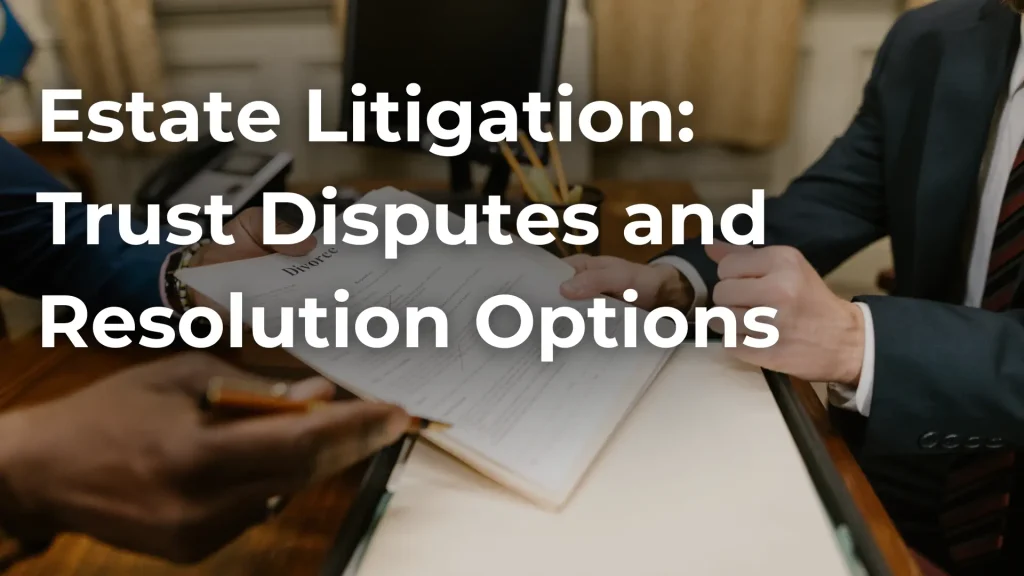

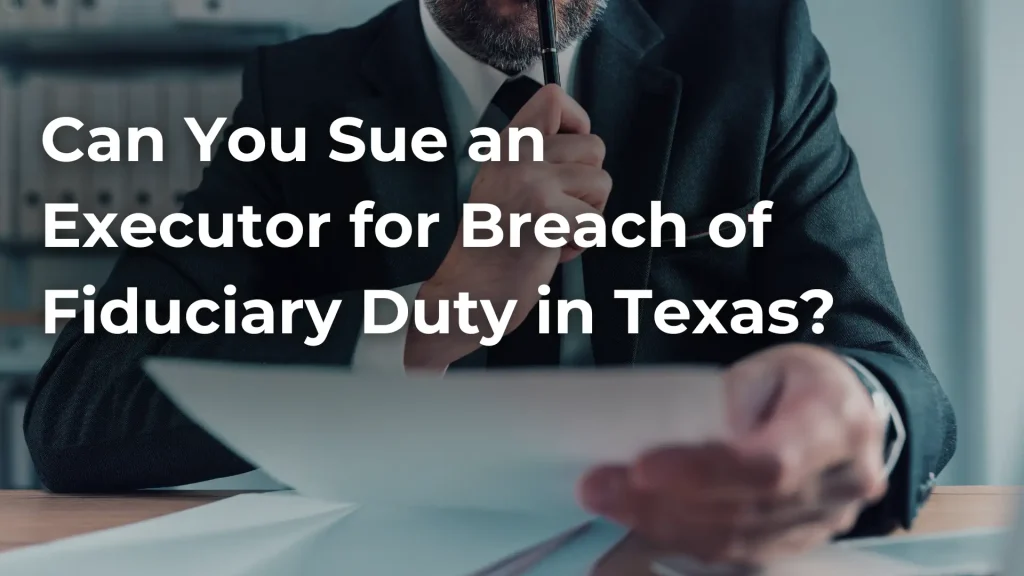
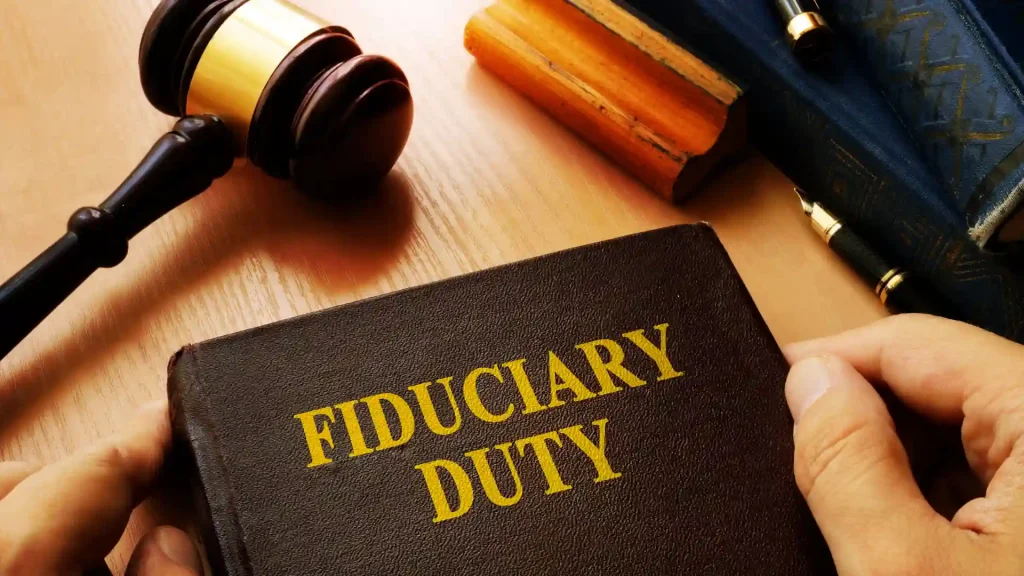

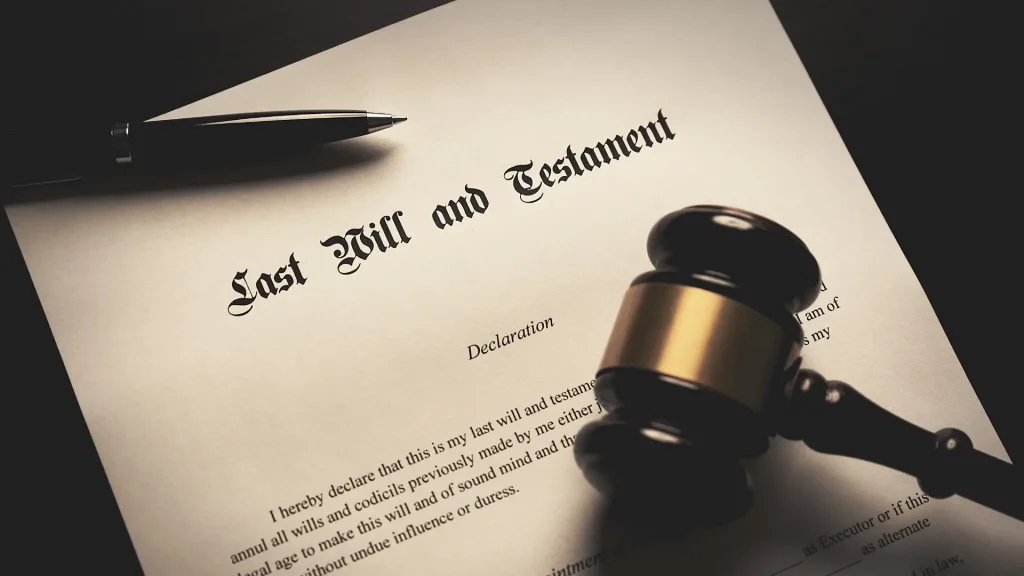 The probate court deadlines are just one part of the puzzle. Probate litigation can be emotionally draining and legally complicated. You’re not just dealing with paperwork. You’re dealing with family dynamics, money, and grief all at once.
The probate court deadlines are just one part of the puzzle. Probate litigation can be emotionally draining and legally complicated. You’re not just dealing with paperwork. You’re dealing with family dynamics, money, and grief all at once. When a loved one passes away, dealing with grief is hard enough—facing an inheritance dispute makes it even harder. But if the will does not reflect your loved one’s true intentions, you may have valid grounds to challenge it. Texas probate
When a loved one passes away, dealing with grief is hard enough—facing an inheritance dispute makes it even harder. But if the will does not reflect your loved one’s true intentions, you may have valid grounds to challenge it. Texas probate  You must present strong, specific documentation to
You must present strong, specific documentation to 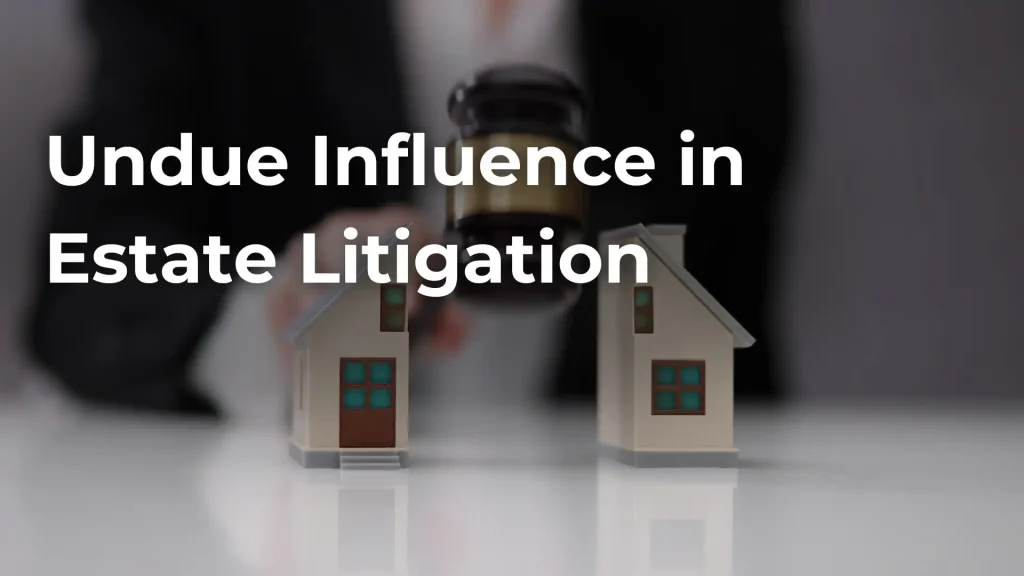
 Invalidating a will due to undue influence will require an heir or beneficiary to prove various elements, such as:
Invalidating a will due to undue influence will require an heir or beneficiary to prove various elements, such as: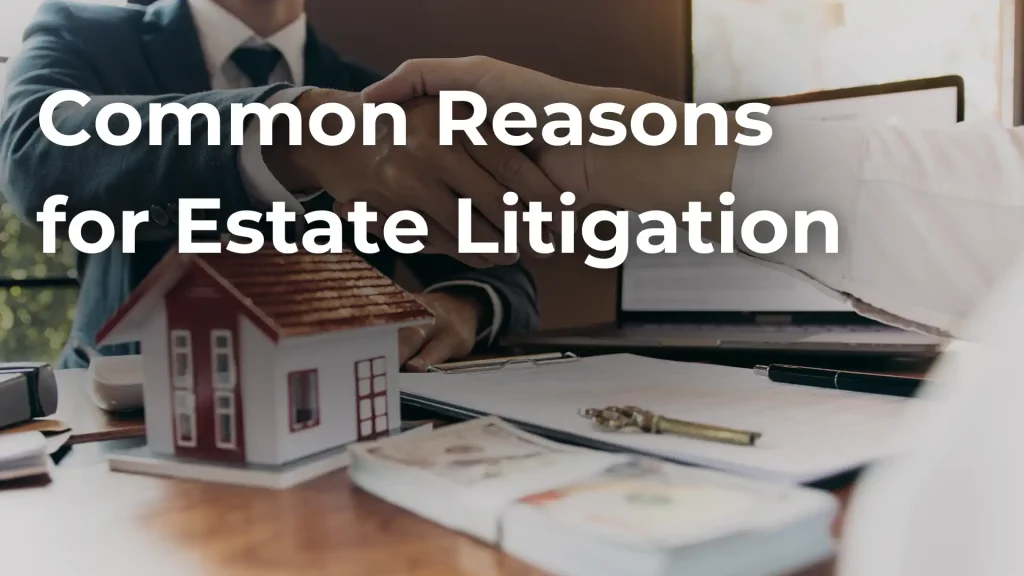 When someone you love passes away, you would like to think their final wishes will be handled without any issues. But that is not always how things go. More and more people are ending up in estate disputes. This is particularly true when family relationships are messy or the deceased had a poorly drafted estate plan. Knowing the
When someone you love passes away, you would like to think their final wishes will be handled without any issues. But that is not always how things go. More and more people are ending up in estate disputes. This is particularly true when family relationships are messy or the deceased had a poorly drafted estate plan. Knowing the  Being caught in an estate dispute is emotionally and legally taxing. Whether contesting a will or defending your role as executor, taking smart, timely steps can protect your rights.
Being caught in an estate dispute is emotionally and legally taxing. Whether contesting a will or defending your role as executor, taking smart, timely steps can protect your rights. 